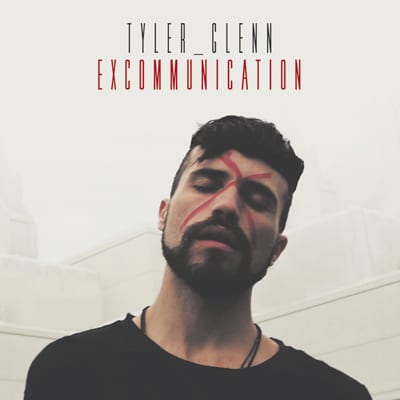Neon Trees’ out frontman Tyler Glenn goes solo, both musically and spiritually

ARNOLD WAYNE JONES | Executive Editor
Look carefully at the picture. Yes, that picture. The mane of spiky chestnut hair. The scruffy beard. The brooding pout, clad in earth-toned leather before a scarlet backdrop. Introspective. Edgy. Anguished.
That’s Tyler Glenn.
Yes, that Tyler Glenn — the sizzlingly colorful frontman for the pop quartet Neon Trees, known for his electric pastels, white-blond crew cut and clean-shaven Mormon face. The poster boy for radio-friendly beats with a wholesome undercurrent has changed. And not just his look: His personal evolution is seismic.
“I gotta be honest: [The change in my image] hasn’t been very conscious. I went through bouts of sincere depression. I started growing my beard out mostly because I didn’t leave my house for three months,” he says, sleepy-eyed while still lying in his bed in Salt Lake City. (He overslept for our interview after taking a red-eye.) And the cause of that depression? He puts it simply: “I had a faith crisis.”
Neon Trees, for all its glam-pop sensibilities, has never hid the fact that its members are all Utah-based life-long Mormons. That didn’t make them Christian rockers in any sense, but it did inform their sensibilities.
 Then in 2014, Glenn publicly came out as gay in Rolling Stone. “It was only two years ago that I came out. I was 30 and I didn’t want to start another decade [hiding who I am],” he explains. Still, the step struck some as incongruous. The Church of Jesus Christ of Latter-Day Saints (LDS), after all, has a notoriously anti-gay history, including substantial support for California’s Prop 8. Glenn, though, didn’t think it would be a problem, and initially, it seemed to work. “I whole-heartedly believed in Mormonism and my ability to reconcile [my faith with my orientation]. I had taught on my mission for two years. My whole life was about trying to make being gay and Mormon work,” he says.
Then in 2014, Glenn publicly came out as gay in Rolling Stone. “It was only two years ago that I came out. I was 30 and I didn’t want to start another decade [hiding who I am],” he explains. Still, the step struck some as incongruous. The Church of Jesus Christ of Latter-Day Saints (LDS), after all, has a notoriously anti-gay history, including substantial support for California’s Prop 8. Glenn, though, didn’t think it would be a problem, and initially, it seemed to work. “I whole-heartedly believed in Mormonism and my ability to reconcile [my faith with my orientation]. I had taught on my mission for two years. My whole life was about trying to make being gay and Mormon work,” he says.
But behind the scenes, tensions were rising. He felt an undercurrent of non-acceptance. Then, less than a year ago, a written official church policy was leaked online. It stunned him.
“The policy stated that same-sex couples and their children were apostates, and if their kids wanted to be baptized they had to wait until they were 18, and then had to renounce their parents.” The policy, Glenn claims, caused at least 1,500 members to do a “mass resignation from the church” within a month of its leak, and caused more than 50 gay suicides within the church.
“It was a huge drama and a disaster,” he says. “That took me down a rabbit hole. I started looking at a lot of things within the framework of the church and the history of the church and I didn’t believe [what I was finding out].”
Glenn acknowledges that it can be difficult for an outsider to his faith to fully grasp the depths of indoctrination… to a point, it seems, teetering on brainwashing.
“I don’t know how to explain it,” he says. “Growing up Mormon is my only perspective, and within that religion, everything is very much black or white — we are taught [that the Book of Mormon] is the restored gospel of Christ on the earth and holds the keys to revelation.” But Google disabused him of many of the things he thought he knew about the LDS Church.

Tyler Glenn says his new look wasn’t a conscious decision — he just didn’t leave his house for three months following a crisis of faith. (Photos courtesy Meredith Truax)
“The Internet, to be honest, [opened my eyes]. I’d been bottling up my identity for years. I always looked on my orientation and nature as something I could pray away. But [I learned] not only is there clearly not a space for [being gay] within this religion, but there are so many falsehoods within the religion that are not what we are taught.”
It felt like “gut-punch after gut-punch,” he says of the revelation, “… not only to gay members and trans members, but to a lot of members as a whole. It took this idea that we’re given choice and agency and removed it from a select group within the congregation. It really fucked with the membership as a whole, because [the policy] didn’t sound like it was from God. It was tearing apart the family instead of bringing it together. That’s just heinous, especially when you say it is from God.”
Glenn had already begun writing songs for a solo album. But the conflict with what he calls “my old religion” sent him into an emotional tailspin that immediately redirected his music.
The result is his new debut solo album Excommunication, which puts in no uncertain terms that Tyler Glenn no longer identifies as Mormon.
“I believed in a very specific God and afterlife,” he says. And current church teachings don’t reflect that, which he sings about in plaintive, effective lyrics.
“This is the most raw and creative record I’ve made,” he says. “It’s a record I have really been ‘in’ as I’ve been making it.”
God didn’t make me like girls he sings on “GDMML Girls,” a searing chronicle of Glenn losing his religion. I tried to kill myself and I’m not the only one. You wanna talk about my sin you wanna say I’m losing it /… I keep on hearing evil voices (voices) they keep on messing with my choices… / God didn’t give me alternatives… when she put me on the earth / God didn’t make me like girls / … If I kiss a boy in public is that cool?
Did he, in fact, attempt suicide? He addresses the matter gingerly.
“I felt very much inside my own body and head,” he says. “I have never turned to drugs or alcohol for coping before, but I tried them and went into a dark place. It will be a year next month from when I first started this paradigm shift. It was terrible, but also has been oddly exciting. It’s been a process — there’s a lot to be excited about once you break this stronghold. And as much as I think it’s a singular experience, I’ve realized a lot of people feel marginalized within religion. It’s very personal, but I’ve realized it’s very universal, too.”
The darkness, and the personal faith crisis, is equally apparent just on the titles of many of the other tracks: “Gods+Monsters,” “First Vision,” “John Give ’Em Hell,” “Devil.” But it’s not all dour downbeats. This is still Tyler Glenn, and the pop elements come through. For instance, “Shameless,” I observe, contains an infectiously acidic dance rock vibe.
“Thank you,” he says. “I started writing the record in an almost a hip-hop, R&B tone. A lot of the shells of each song started with a simple beat and a sparse melody, and then I would write on top of it.” But as he progressed, Glenn began to feel a pull from artists and genres he didn’t usually incorporate into his music, from Nine Inch Nails to late-’80s Depeche Mode.
“The tone and sound were the most conscious decisions we made [for the album],” he says. “Not having a band on the record, it felt like there wasn’t much of a ceiling sonically on what we could do. We knew the sound and tone and theme and what we were saying within the record, but we wanted to touch on an introspective journey — a soundtrack to a night drive.”
The music — the album’s content, as well as what triggered it — have apparently left a kind of gash in Glenn’s relationship with the other members of Neon Trees, though he dances around it cautiously. His video for the single “Trash ”contained “a lot of specific LDS imagery,” he says, which is seems rubbed the group’s other members the wrong way.
“We’ve been on a journey together — to understand where we are now, and how we can proceed,” Glenn says. “We’re talking about future records. But creatively, and as a person, I’m different than the guy I was a few years ago.” And there’s no turning back.
This article appeared in the Dallas Voice print edition October 21, 2016.












